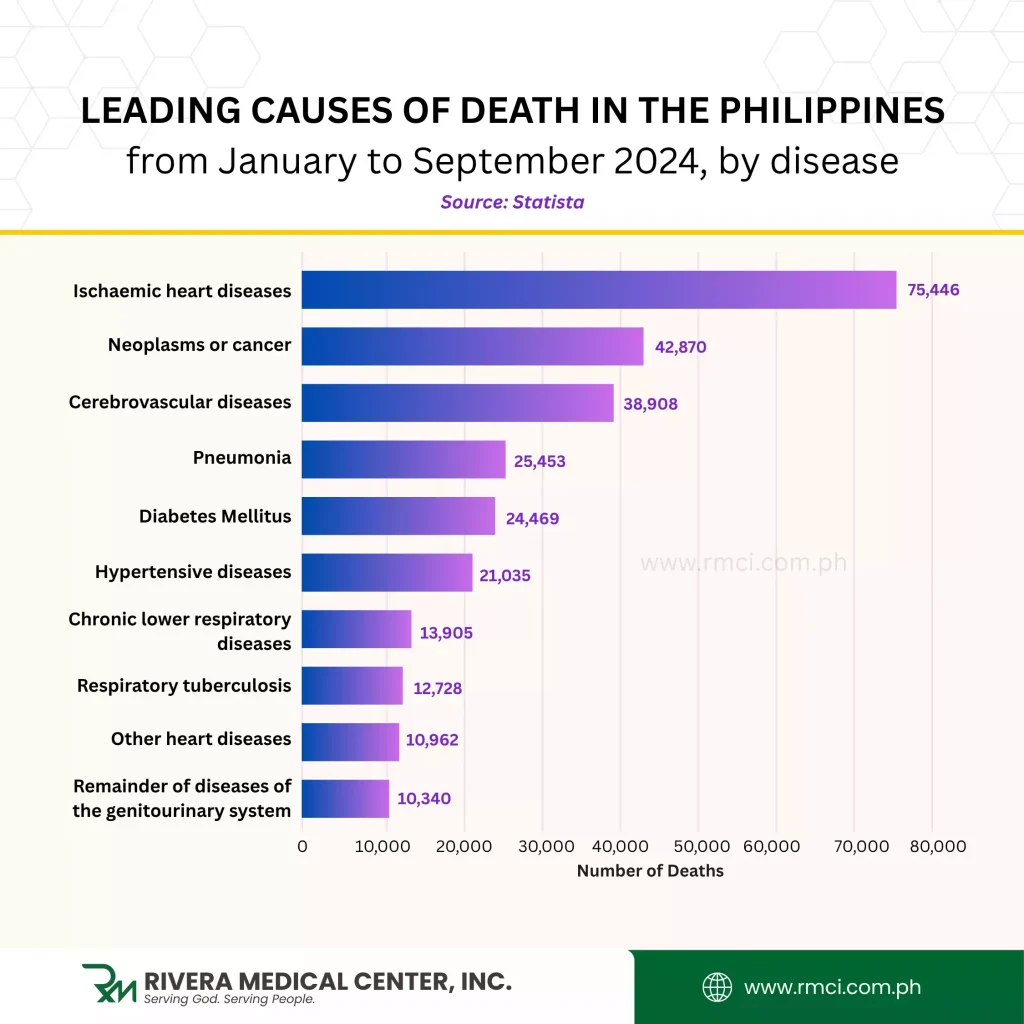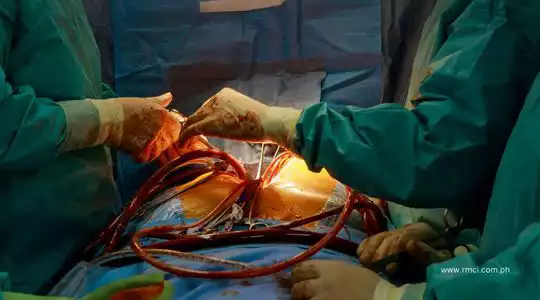Lung health in the Philippines is a serious problem. Respiratory diseases are now ranking among the leading causes of death in the Philippines. As of 2025, pneumonia ranked as the fourth leading cause of death in the Philippines, with over 33,040 cases as of 31 March 2025. Chronic lower respiratory diseases and respiratory tuberculosis were also marked as one of the top ten causes of death among Filipinos from January to September in 2024.

Respiratory illnesses have long plagued the nation, further aggravated by a complex interplay of socioeconomic, environmental, and behavioral factors.
Lung health in the Philippines: Key Issues and Concerns
High Prevalence of Respiratory Diseases
Respiratory diseases are consistently ranked among the top causes of sickness and death in the Philippines. Acute respiratory infections, pneumonia, chronic obstructive pulmonary disease (COPD), and tuberculosis (TB) continue to affect millions of Filipinos each year, straining families and the health system alike.
Lung Cancer
Lung cancer remains one of the deadliest cancers in the Philippines. Due to late diagnosis, most cases are discovered an advanced stage, leading to poor outcomes. Risk factors associated with lung cancer include tobacco smoke, air pollution, and occupational hazards that weaken the lungs.
Air Pollution
Air pollution also contributes to the spike of lung diseases in the Philippines. Urbanization and industrial growth in many regions, especially Metro Manila, is damaging air quality and the natural environment. Harmful particulates from vehicles, factories, and household pollution contribute greatly to rising cases of asthma, bronchitis, and other lung diseases among Filipino households.
Smoking
The Philippines is among the countries with the highest smoking rates in Asia. Cigarette consumption, particularly among men and even youth, fuels several lung conditions, from chronic bronchitis to cancer. Despite tobacco control policies, smoking remains a grave threat to the nation’s lung health.
Specific Respiratory Conditions Among Filipinos
Many in the Philippines grapple with a wide spectrum of respiratory health conditions, including:
- Tuberculosis (TB): The country is a global TB hotspot. Despite aggressive government campaigns, TB remains one of the leading causes of death, particularly among the economically disadvantaged.
- Asthma and Allergies: Childhood asthma is also common among Filipinos. This is aggravated by conditions like pollution, poor housing, and limited access to preventive care.
- Chronic Obstructive Pulmonary Disease (COPD): Often underdiagnosed, this chronic condition severely hampers breathing and overall quality of life.
- Pulmonary Infections: Pneumonia is the top cause of death among children. This highlights the urgent need for preventive and early intervention services.
Government and Institutional Efforts for lung health in the Philippines
Both Philippine government and private institutions have intensified campaigns to improve lung health in the Philippines. Here are few worth mentioning.
Lung Center of the Philippines (LCP)
This specialty hospital in Quezon City leads in research, training, and care for lung diseases. It provides state-of-the-art treatment and supports nationwide initiatives.
TB Dots Centers
The Directly Observed Treatment, Short Course (DOTS) strategy is key in battling TB, ensuring patients complete their medication cycles under supervision. Rivera Medical Center’s own TB Dots center exemplifies this approach by delivering compassionate, supervised therapy to TB patients across Panabo City and nearby cities in Davao Region.
National Lung Month Initiative
Every August, National Lung Month renews awareness and advocacy for lung health, as provided under Proclamation No. 1761. As of August 2025, the National Lung Month is “Healthy Lungs, Healthy Pilipinas: TB ay Labanan, Buhay ay Ingatan.” Across the Philippines, educational drives, free screenings, and public forums drive home the message of prevention and early care for lung health.
Lung Health Research and Advocacy
Ongoing research by the Department of Health (DOH) and other medical institutions inform policy and public awareness campaigns to target triggers like smoking and air pollution. These endeavors also give Filipinos critical knowledge on reducing risk factors associated with lung problems.
Screening Programs
Regular screening for tuberculosis, lung cancer, and other conditions helps detect and treat diseases early, improving survival rates.
Lung Health Efforts in Davao Region
Davao Region, including Panabo City, has been a focus for expanded air pollution monitoring, anti-smoking campaigns, and access to TB screening—efforts in which Rivera Medical Center plays an active role.
Steps to Improve Lung Health in the Philippines
Improving lung health in the Philippines requires individual and collective action among Filipinos.
- Early Detection and Treatment:
Adopting regular checkups with pulmonologists, as offered at Rivera Medical Center, ensures lung diseases are detected in their earliest, and most treatable stages. - Quit Smoking:
Smoking cessation saves lives. Hospitals like Rivera Medical Center offer counseling and medical support tailored to help patients develop better life choices that lead away from dependence on cigarette smoking. - Healthy Lifestyle:
Proper nutrition, regular exercise, and avoiding exposure to pollutants are essential to robust lung health. - Air Quality Awareness:
Promoting the use of air filters, face masks, and supporting green policy initiatives reduces our collective exposure to airborne harm. - Support Public Awareness on Lung Health:
Knowledge empowers communities. Rivera Medical Center, as a healthcare leader, regularly hosts seminars and information campaigns on lung health for Panabo residents.
Lung Health Services in Davao Region and Panabo City
Panabo City, and nearby cities like Davao City and Tagum City, is growing in urban development and bustling with trade. These advancements require high-quality healthcare for its growing population. Rivera Medical Center rises to this challenge, offering:
- Expert Pulmonology Services: Patients can consult with board-certified pulmonologists, ensuring world-class diagnosis and management of asthma, COPD, lung cancer, and other pulmonary illnesses.
- Comprehensive TB Dots Center: Rivera Medical Center’s TB Dots program is a lifeline for TB patients, providing accessible, supervised treatment, counseling, and community outreach.
- Modern Facilities and Diagnostic Tools: Rivera Medical Center is equipped with X-ray, spirometry, and laboratory services for rapid and accurate lung disease assessment.
- Health Education Initiatives: Hospitals collaborates with local government and NGOs to promote regular lung screenings, anti-smoking campaigns, and clean air advocacy in schools and workplaces.
- Coordinated Referral System: For complex cases in Davao and Panabo City, Rivera Medical Center maintains partnerships with the Davao Regional Medical Center, and national lung centers for seamless continuation of care for patients with respiratory illnesses.
Conclusion: State of Lung Health in the Philippines
Lung health in the Philippines is a growing problem. With pneumonia as one of the top causes of death in the Philippines, the government and hospitals need to consider even the socioeconomic, environmental, and behavioral factors that lead to lung disease.
Rivera Medical Center’s dedication to lung health—anchored by experienced pulmonologists and a robust TB Dots program—is aimed to only saves lives but empowers Panabo City to breathe easier and live fully. Contact our pulmonologists at 09257807696 for early detection and consultation with any lung-related problem.
Sources: World Health Organization (WHO), Philippine Department of Health (DOH): National Tuberculosis Control Program, Lung Center of the Philippines: Annual Report. Philippine Statistics Authority



